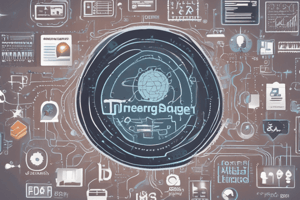Podcast
Questions and Answers
Which of the following is NOT considered one of the 5 D’s of managing digital marketing interactions?
Which of the following is NOT considered one of the 5 D’s of managing digital marketing interactions?
- Digital design (correct)
- Digital media
- Digital technology
- Digital devices
The buyer persona is the same as the user persona in digital marketing.
The buyer persona is the same as the user persona in digital marketing.
False (B)
Name the framework that includes Reach, Act, Convert, and Engage.
Name the framework that includes Reach, Act, Convert, and Engage.
RACE Framework
The combination of traditional and digital marketing strategies is known as __________ marketing.
The combination of traditional and digital marketing strategies is known as __________ marketing.
Match the following terms with their descriptions:
Match the following terms with their descriptions:
Which of the following is NOT a benefit of developing a digital marketing strategy?
Which of the following is NOT a benefit of developing a digital marketing strategy?
Digital technology's main purpose is to support marketing and business objectives.
Digital technology's main purpose is to support marketing and business objectives.
What does 'SEM' stand for in digital marketing?
What does 'SEM' stand for in digital marketing?
Which of the following is NOT a benefit of digital marketing according to the 6 I's?
Which of the following is NOT a benefit of digital marketing according to the 6 I's?
Outbound marketing utilizes a pull approach to attract customers.
Outbound marketing utilizes a pull approach to attract customers.
What does KPI stand for in the context of digital marketing?
What does KPI stand for in the context of digital marketing?
Digital marketing supports __________ marketing across multiple channels.
Digital marketing supports __________ marketing across multiple channels.
Match the digital communication tools/media channels with their descriptions:
Match the digital communication tools/media channels with their descriptions:
What is the primary purpose of lead generation in digital marketing?
What is the primary purpose of lead generation in digital marketing?
Brand recall is measured by the number of individuals who remember a brand and identify it correctly.
Brand recall is measured by the number of individuals who remember a brand and identify it correctly.
The __________ approach in marketing focuses on attracting customers through valuable content and interactions.
The __________ approach in marketing focuses on attracting customers through valuable content and interactions.
Study Notes
Digital Marketing Overview
- Digital marketing focuses on audiences and their interactions with businesses through various digital channels.
- The five key aspects of managing digital marketing interactions are digital devices, platforms, media, data, and technology.
Buyer Personas and Customer Lifecycle
- A buyer persona is a profile that includes socio-demographic traits, values, and lifestyle of the target consumer.
- The customer lifecycle includes several marketing touchpoints mapped out using the RACE Framework: Reach, Act, Convert, Engage.
Media Types in Digital Marketing
- Paid, earned, owned, and experience media are interconnected and require integration for effective marketing strategies.
Digital Marketing Essentials
- Digital marketing leverages data, online presence, and SEM (search engine marketing) to meet marketing objectives.
- Omnichannel marketing combines traditional and digital strategies for a seamless customer experience across the journey.
Content Marketing
- Involves engaging audiences through various content forms like blogs, articles, social media posts, and videos, exemplified by campaigns such as Benefit Cosmetics.
Strategic Framework of Digital Marketing
- A successful digital marketing strategy clarifies the use of digital technologies to support business goals, including customer segmentation and delivering value.
- Emphasizes the integration of online and offline marketing efforts.
Benefits of a Digital Marketing Strategy (5 S Framework)
- Sell: Increase sales volume.
- Serve: Enhance customer value.
- Speak: Foster a two-way dialogue with customers.
- Save: Reduce operational costs.
- Sizzle: Expand brand presence and create new offers.
Usage of Digital Tools in Marketing
- Companies engage in transactional e-commerce, relationship building, brand-building, and cultivating online communities to enhance marketing efforts.
RACE Framework Breakdown
- Reach: Create awareness through online and offline channels.
- Act: Engage audiences via multiple platforms.
- Convert: Focus on achieving marketing goals like fan engagement or sales conversions.
- Engage: Develop relationships with customers to encourage retention.
Digital Communication Tools
- Categories include search engine marketing, online PR, partnerships, display advertising, opt-in email, and social media marketing.
Benefits of Digital Marketing (6 I's)
- Interactivity: Customers initiate contact.
- Intelligence: Cost-effective data gathering and market research.
- Individualisation: Personalized communication.
- Integration: Supports multichannel strategies.
- Industry restructuring: Influence on representation through intermediaries.
- Independence of location: Global marketing reach.
Inbound vs. Outbound Marketing
- Inbound Marketing: Pull approach attracting customers naturally.
- Outbound Marketing: Push approach proactively reaching out to audiences.
Key Performance Indicators (KPIs)
- Essential metrics for tracking effectiveness in lead generation include traffic, traffic-to-lead ratio, cost per lead, and brand recall.
- Lead Generation: Refers to capturing interest from potential customers, measuring the effectiveness through various metrics.
Measuring and Improving Metrics
- Website traffic monitored via Google Analytics helps assess marketing impact.
- Traffic to lead conversion is calculated to evaluate effectiveness of visitor engagement.
- Cost per lead determines ROI on marketing spending, guiding optimization efforts.
- Brand recall is measured through surveys to gauge public recognition, enhanced by authentic branding and targeted marketing efforts.
Studying That Suits You
Use AI to generate personalized quizzes and flashcards to suit your learning preferences.
Description
This quiz explores the various platforms in digital marketing and their significance in customer interactions. Additionally, it evaluates the advantages and challenges of digital media while identifying the differences in customer communication strategies for digital versus traditional marketing. Test your understanding of these essential concepts!



